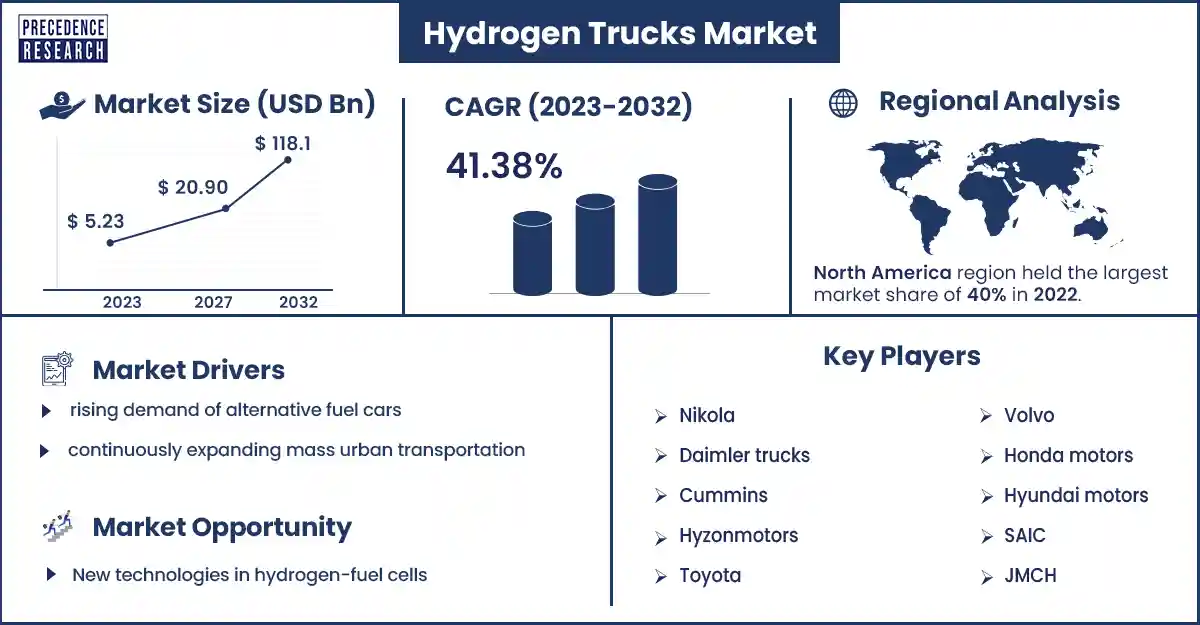December 2024
The global hydrogen trucks market size surpassed USD 5.23 billion in 2023 and is estimated to cross around USD 118.1 billion by 2032, poised to grow at a CAGR of 41.38% from 2023 to 2032.

The hydrogen trucks market is likely to expand in the upcoming years with rising investment from vehicle manufacturers and commercial fleets in hydrogen-powered trucks across the globe. Alongside this, the technological advancement in hydrogen cells to mitigate C02 emissions is observed to fuel the market’s expansion.
The hydrogen trucks market is a subcategory of the automotive industry involved in the production, commercialization, and maintenance of trucks that utilize non-traditional energy sources. A hydrogen truck is a heavy-duty vehicle that is powered by an all-electric propulsion system that uses hydrogen fuel cells as its primary energy source. These vehicles are powered by hydrogen fuel cells that do not release exhaust gas or other pollutants that cause emissions. The automotive sector is a major contributor to air pollution due to the partial burning of fossil fuel-powered vehicles. Thus, growing environmental concern promotes the adoption of hydrogen trucks.
Infrastructural development in the hydrogen trucks industry to fuel the market’s growth
The global hydrogen trucks market is likely to grow with the emergence of several technologies. The rising sales of hydrogen fuel cell trucks due to the growth of hydrogen fueling infrastructure are mainly driven by advancements in electrolysis technology that is used to produce hydrogen; in addition, the development of hydrogen storage technology to transport and store hydrogen also impacts the market growth positively.
Advancements in hydrogen fuelling infrastructure have been initiated by partnership programs between private companies, government agencies, and research institutions. For instance, in the U.S.A., the Department of Energy (DOE) partnered with automotive companies such as Honda and General Motors to develop new hydrogen fuel cell vehicles along with the development of hydrogen-filling infrastructure. Also, in Europe, the European Commission (EC) funded several research projects engaged in the research and development of hydrogen fuelling infrastructure. Thus, several partnerships among public entities and private bodies are likely to boost the growth of the hydrogen trucks market.
However, the higher production cost involved in the manufacturing process of hydrogen engines compared to traditional fuel engines is observed to act as a major hindering factor for the market. Hydrogen truck companies are often focused on maximizing their profits, which in turn increases the overall cost of the vehicles, which can be a significant barrier in the market.
| Report Coverage | Details |
| Market Revenue in 2023 | USD 5.23 Billion |
| Projected Forecast Revenue by 2032 | USD 118.1 Billion |
| Growth Rate from 2023 to 2032 | CAGR of 41.38% |
| Largest Market | North America |
| Base Year | 2022 |
| Forecast Period | 2023 to 2032 |
| Regions Covered | North America, Europe, Asia-Pacific, Latin America, and Middle East & Africa |
Recent Development by Hyundai Motor Company
Recent Development by Ballard Power Systems
Asia Pacific is estimated to be the fastest-growing region during the forecast period. The governments of countries such as Japan, Korea, India, and China are engaged in launching initiatives to support hydrogen fuel in trucks and buses, along with the development of hydrogen refueling stations that are likely to boost the market growth in this region.
North America dominated the global hydrogen trucks market in 2023. The market is mainly driven by the rising demand for hydrogen trucks from the logistics sector. Also, the presence of market players such as Cummins Plug, Power Inc., and others has also driven the growth of the market. Moreover, several product launches, joint ventures, and business expansions by market players are also driving the growth of the market. The U.S. has shown notable growth in the market within North America. It is simple to blame the increase in demand for hydrogen trucks on modern technology and growing public awareness of carbon emissions. Additionally, in order to improve their market position, a number of truck manufacturers are implementing partnerships and alliances. Also, the rising trend of captive trucking in mining and ports in the U.S., along with the growing demand for heavy machinery in the forestry sectors and construction, creates growth opportunities for hydrogen vehicles in the upcoming years. FCEVs are also estimated to contribute up to 10 % of commercial fleets and truck sales in 2030 and 35 % by 2050.
New technologies in hydrogen-fuel cells
The automotive industry has changed rapidly in recent times. Due to advancements in science and technologies in the automobile sector, automotive companies have started investing in the development of emission-free vehicle engines to lower pollution levels and provide higher efficiency than traditional engines. The use of hybrid engines is increasing rapidly, and people tend to adapt to electric and hydrogen-based engines in vehicles. The development of technologies such as Proton Exchange Membrane (PEM) and Electrochemical–Thermally Activated Cycle (E-TAC) in hydrogen fuel cells is expected to create growth opportunities in the future.
Market Segmentation
By Product
By Application
By Range
Buy this Research Report@ https://www.precedenceresearch.com/checkout/2482
You can place an order or ask any questions, please feel free to contact at sales@precedenceresearch.com | +1 650 460 3308
December 2024
January 2025
April 2025
January 2025